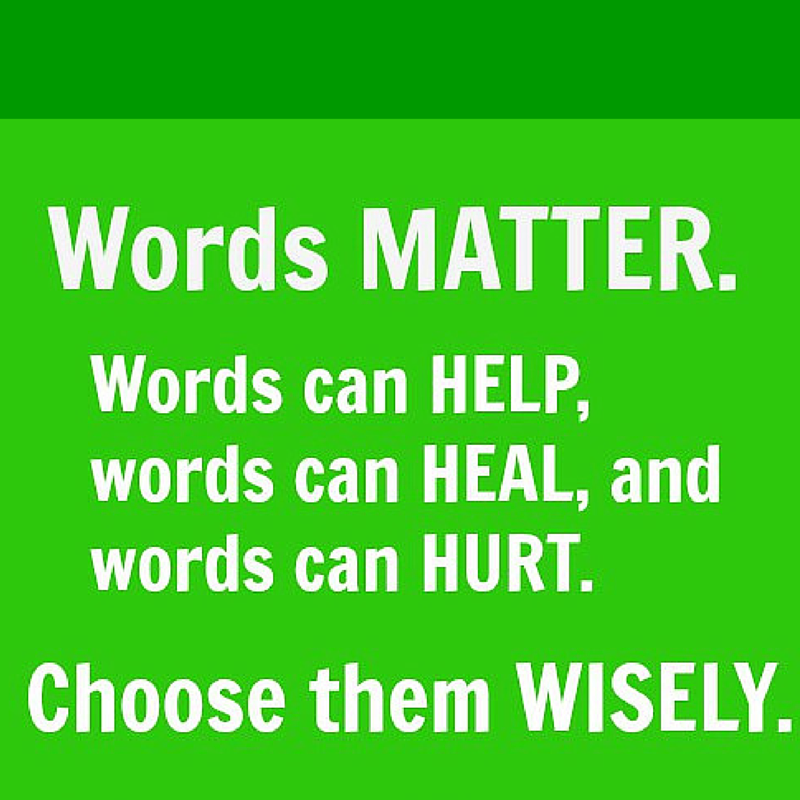
I always thought it did. But now I’m not so sure! What really matters is what empty and full mean to you and the association you conger up when you think about those words.
I’m sure you’ve heard the old adage “Stick and stones may break my bones, but words will never hurt me.” Do you really believe that to be true? Because I believe words have power, they impact you to the core. Words create dreams, books, and movies. Words evoke emotions. They cause you to take action or inaction. Your thoughts are words which then induce certain feelings and there is that cause and effect relationship, what came first the word or the meaning of the word associated to it? Am I being too wordy? Perhaps…
There is an endless stream of information out there about choosing your words carefully and why, and one of my many goals in 2016 is to become hyper aware of what words I use. For instance, I had a meeting today and we were working out a time for a follow up appointment. When the initial time was suggested, it didn’t work, so another time was suggested. My initial response was “Oh I can probably make it” as I said it, I realized that probably sounded very non-committal, what was really happening in my mind while I was responding was this…
9am? Am I going to be able to make it on time? Is my husband working? Do I have to drop of the kids? I was also beginning to calculate the time from drop off to the appointment time, would I have enough time to get there for 9am because I detest being late for an appointment.
Instead of pausing and taking the time to think it through, I had blurted out the above. Then I back tracked realizing that a 9am is doable and said, “Yes I can be here for 9” immediately I felt better and more in integrity with myself. You see the words we use do dictate how we function in the world. This is the basis of Neuro-linguistic Programming, otherwise known as NLP.
The definition of NLP (take from nlpu.com)
…a name that encompasses the three most influential components involved in producing human experience: neurology, language and programming. The neurological system regulates how our bodies function, language determines how we interface and communicate with other people and our programming determines the kinds of models of the world we create. Neuro-linguistic Programming describes the fundamental dynamics between mind (neuro) and language (linguistic) and how their interplay affects our body and behavior (programming).
The majority of Life Coaches have some level of training in NLP as it’s important for a coach to understand why their clients are using the words that they use, how that that affects the client’s view of themselves and how they operate in the world.
If you have read my previous articles, you will know that I label myself a Can’t-aholic. There are many reasons for this and if you want to know more about that, then pick up a copy of my book: Confessions of a Can’t-holic (currently on Amazon.com). That being said, as positive as I may seem my initial response to trying some new or thinking about a situation a different way, is I can’t. Can’t is a very disempowering word. Think about it, when you say “I can’t” you are diminishing your power. For example: I can’t eat that piece of cake because I’m on a diet. You are giving the power to your diet; it’s because of the diet that you are not eating the piece of cake. Now imagine that you replace the word “can’t” with the word “won’t”: I won’t eat that piece of cake because I am on a diet. Won’t is an empowering word it gives you control of whether or not you are going to have the piece of cake and not the diet. For me, the word can’t holds me hostage and the word won’t gives me choice. See the difference a word can make?
Let’s try another example to really hit this home! How about the word “try”? When I was supervisor, I had some agents on my team that had punctuality issues. I remember addressing them, and the response I got was: Okay I am going to try my best to come on time from now on. Really? You are going to try? In this instance try is really a cope out word, a non committal word. Realistically if you have ongoing punctuality issues, either you show up on time or you do not. It’s the same as saying you are going to try to come to my party. What exactly are you saying? How are you going to try? Either you are coming or you are not. It’s a simple as that. Of course, you have to take words within the context of where they are showing up.
To sum it all up, what I am saying here is that be cognizant of the words you are using, because they really have an impact on how you function in the world. So remember the next time you say “I can’t” or “I’ll try” what are you really saying and what’s the meaning behind it! If you do this you will begin to change your world!
It’s my honour to serve you! God Bless!
I would love to hear your thoughts!
Email me at nina@theapostropheproject.com


 South Asian News E-Paper
South Asian News E-Paper Punjabi News E-Paper
Punjabi News E-Paper

















